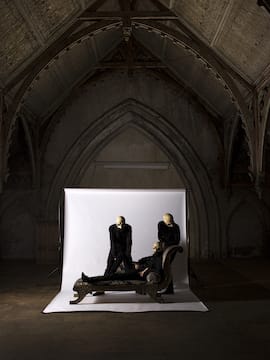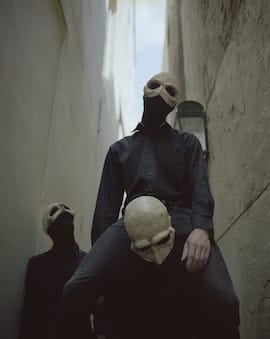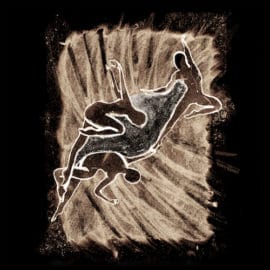Since the release of their debut „De Verste Verte Is Hier“ LASTER created their own exceptional style of black metal with an avantgarde twist which they themselves call „obscure dance music“. Their latest record „Het Wassen Oog“ was released through the renowned German label Prophecy Productions. In our interview, the band told us about how they got signed by their new label, why LASTER lyrically deal with topics that are rather unusual in their genre and what paradox is a part of many black metal bands.

Comparisons with other bands are common in the music business. But with you I can hardly think of a fitting band – probably Shining from Sweden. Where do you yourself draw inspiration from?
Sniffing glass from blue screens while doing the laundry backstage. We draw inspiration from many things in daily life; not only music.
Especially in black metal many bands just reproduce a certain pattern. Why do you think so many artists of this genre are not interested in bringing something new to the table?
Because they self-identify with a certain pattern, feeling, dogma or visual representation. Which is fine. Some black metal musicians and fans drink a cup of coffee every morning. Black coffee, no sugar, no milk. If you add sugar or milk, then they won’t drink it. No, not one sip.
 Do you think there can be a certain merit to just playing according to an already established style, if it’s done with passion?
Do you think there can be a certain merit to just playing according to an already established style, if it’s done with passion?
‘A certain merit’ sounds rather undefined, which is why it would be silly to negate. When viewed from an artistic point of view, thus after the example of the modern arts, then romanticist ideas of individuality, originality, unicity and authenticity come to the fore. Interestingly, such ideas often seem related to by many bands of different strands of black metal that, perhaps like you say, more or less play according to an already established style. Such bands incorporate themes of rebellion against the universal law of God, individual emotions, loneliness, feelings of being part of history, natural religions, Heimat, or even Nietzsche. Those are themes that relate to the romanticist advocacy of authentic expression of the individual. The merit of playing black metal as it is already established within the sphere of black metal culture, then, does not appear to be found in the authentic expression of the individual even though it is rooted in this system of beliefs. Rather, it’s merit might be found in connecting with or strengthening a certain identity. This appears to be quite paradoxical, which is interesting as it might show something about globalizing and fragmented society in which we form our desires.
Your music is very unusual, the listeners always have to expect the unexpected. Do you sometimes have to hold yourself back in songwriting in order not lose direction?
We don’t kill many ideas as soon as they surface. They do morph continuously though as they are (re)combined with other elements – even up to a point at which they share very little resemblance with their original form.
What makes a piece of music coherent in your opinion?
Blastbeats.
Your tracks have become a bit shorter from album to album. Is this a conscious development or did it just happen by chance?
The excitement to incorporate many ideas might have something to do with us trying to stay away from over-repeating ourselves.
 With „Het Wassen Oog“ you released your third album and your Prophecy debut at the same time. Would you say that you have continued your previous style or have you rather aimed at reinventing yourself?
With „Het Wassen Oog“ you released your third album and your Prophecy debut at the same time. Would you say that you have continued your previous style or have you rather aimed at reinventing yourself?
Compared with our previous record we cranked everything up to 11, with some accidental reinventing as an outcome. “Het Wassen Oog” does feel like a natural successor of our previous record “Ons Vrije Fatum”, but exaggerated. We demanded technical improvement of our instrumental and vocal abilities, bigger contrasts and wider experiments in order to reach the openness and variety at which we are now.
I have the impression that some of your songs are quite complicated to play. Which of your new tracks do you personally find most challenging from a technical point of view?
Perhaps „Ondersteboven“ or „Zinsbetovering“.
You write all the lyrics to your songs in your native language, so certainly not all of your fans understand them without looking them up. Can you therefor briefly describe what „Het Wassen Oog“ is about thematically?
As with the former two albums, we explore daily, but nonetheless ‘big’ concepts of love, distress, confusion, sexuality, identity… While we re-imagine and reinterpret the contingencies that we are part of throughout our lives, we mix it up with scenic experiences and fantasies in which the unexpected occurs. This is not a distortion of our memories. If we live in a disenchanted world, as some of the great intellectuals have argued for, we seek to re-enchant our lives but without religion in any traditional sense. This magic-realist sort of experience affects and helps us create our artistic projects.
Also, on this album we have tried to make explicit that these broad concepts mentioned above really occupy our private and social lives, and that we notice that this counts for others in various social strata around us as well. As a result, we think that the Evil Eye is not relevant and interesting to us anymore. On the contrary, it seems to become pushed away from the stage more and more. We think that many of the traditional extreme metal themes that touch upon evil and Satan are threatened by meaninglesness, because it has become recycled so much without its relevance sufficiently being discussed.
How important are the lyrics to you personally compared to the music itself?
They drive the music, and vice versa.
 The graceful artwork shows the same style as your first two albums. Would you say that this visual aesthetic is a crucial part of your art or could you imagine a completely different cover image for a future album?
The graceful artwork shows the same style as your first two albums. Would you say that this visual aesthetic is a crucial part of your art or could you imagine a completely different cover image for a future album?
‘Het Wassen Oog’ is the conclusion of a trilogy, so it feels only natural to imagine a new visual style for future material.
As mentioned before, you released the new album through Prophecy Productions. What excited you about working with this particular label?
Prophecy has been a huge influence on us as musician since we were teens. Bands like Alcest, Lantlôs, Nucleus Torn, A Forest of Stars, Falkenbach, Drautran, Tenhi and Les Discrets influenced us immensely, even though that might not be audible rather easily. It’s the experimental, yet atmospheric and intriguing character of Prophecy that truly speaks to us. Moreover, we find it quite satisfying to be on the same roster as Kayo Dot.
„Het Wassen Oog“ seems to have received mainly euphoric feedback. About a negative review, however, you put a pretty funny posting on Facebook. How did you get the idea to react this way?
The reaction wrote itself. The shrine still stands. Long live Maarten.
A lot of other bands don’t care about the reviews concerning their albums or take themselves too seriously to meet them with humor. Do you think reviews, be it positive or negative ones, might even be helpful to you in some way?
A review shines a light on both the artist and the reviewer. There is always something constructive to be found, no matter its stance. That being said, we do think that the value of the review has changed throughout the years. These days we’re two clicks away from listening to newly released material – and we’ve been granted the tools to spread our opinions far and wide.
What are your next plans for LASTER?
Tour, write new material and expand both musically, lyrically and visually.
At Metal1.info we usually end our interviews with a short brainstorming. What do you think about the following terms?
Disco music: musically, yes, culturally, no
Avantgarde: please do
Expressive dance: yes
Politics in music: music is inherently political
Social media: yesno
Dutch metal scene: yesno
Thanks again for your answers. If you’d like to say a few last words to the readers, you’re welcome to do so now:
We look forward to meeting new faces. We’ll be visiting Germany at Prophecy Fest in Balve on the 13th of september and Wintermelodei 2019 in Münster on the 7th of December. Hopefully we’ll see you around.
Dieses Interview wurde per E-Mail geführt.
Zur besseren Lesbarkeit wurden Smilies ersetzt.
